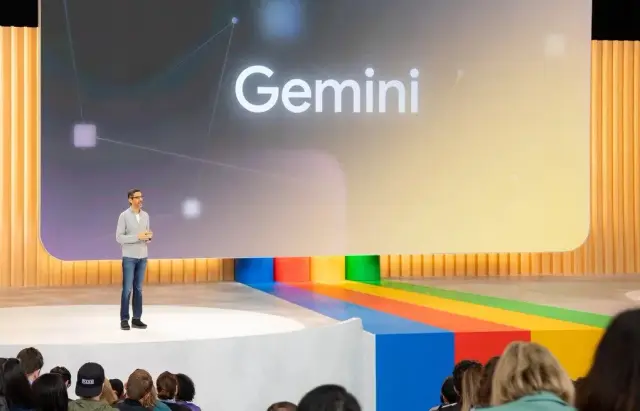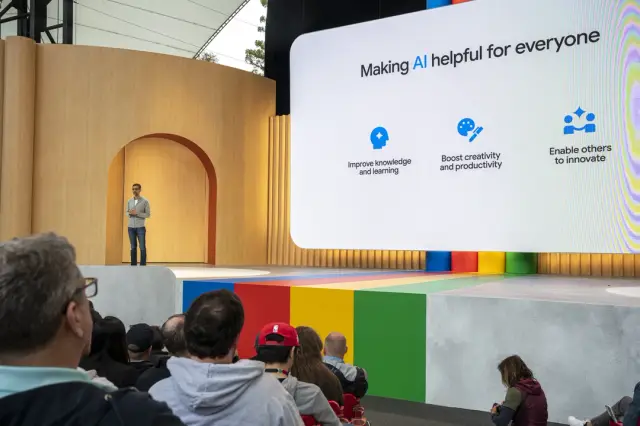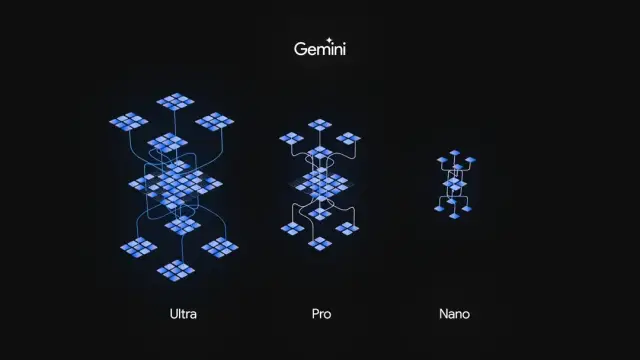Google's Gemini: What It Means for Tech Advancements
Explore Google's Gemini AI model and its impact on technology with our in-depth look at its multimodal capabilities, scalability, and how it's shaping the future of AI for developers and enterprises.

What is Gemini?
Multimodality in the context of artificial intelligence refers to the capacity of an AI system to interpret, understand, and generate outputs that incorporate multiple types of data, such as text, images, sounds, and videos. This approach mirrors how human intelligence processes information, integrating sensory inputs to form a holistic understanding of the world. Therefore, A multimodal AI can glean insights from a dataset that includes visual and textual elements, such as understanding a meme, or from a complex dataset including audio, code, or other media.
Gemini, Google's foray into the realm of multimodal AI, stands as a testament to the potential of this approach. Engineered from the ground up, Gemini is distinct in its native understanding of different forms of data without the need for piecemeal solutions or separate component training. It is a versatile AI model, fine-tuned to incorporate and leverage the nuances of various input modalities.
Gemini's capabilities are numerous and varied. It can reason through complex, abstract concepts that require interconnected understanding across different domains, such as explaining phenomena in physics when given visual and textual information. By effectively combining different types of inputs, Gemini offers possible answers or predictions that reflect a deep and nuanced comprehension. Whether it's interpreting the context of a conversation, recognizing objects and sentiments in images, or making sense of audio cues, Gemini brings a new level of sophistication to AI applications.
Moreover, Gemini is built to be accessible across various devices and platforms, ensuring its utility is not constrained to high-performance computing environments. This adaptability means that Gemini has the potential to revolutionize a myriad of industries, from healthcare, with its ability to analyze medical imagery and patient histories, to autonomous vehicles that must process real-time sensory data. Its introduction marks a significant milestone in the advancement of AI. It underlines the strides Google is taking towards creating more intelligent, responsive technology that reflects the complexity of the world it aims to serve and understand.

The Dawn of Gemini: A Multimodal AI Game Changer
The unveiling of Gemini is not just another ripple in the vast ocean of AI advancements; it's a tidal wave of change that promises to redefine the relationship between machines and the multitude of data forms we use to communicate and understand the world around us. In essence, Gemini is designed to tackle the challenges of AI in a world that doesn't simply communicate in text or numbers but conveys meaning in a complex blend of language, visuals, sounds, and more. For the first time, we stand before an AI model that is truly built from inception to process these distinct channels of information as a single, cohesive entity.
The multimodal learning approach that Gemini employs is akin to a human's ability to engage with the world, interpreting and understanding multiple stimuli seamlessly. For instance, we naturally comprehend a joke explained in a book while referencing an accompanying illustration. This level of interpretative understanding was previously fragmented at best within the realm of AI. Now, Google's Gemini promises to understand the punchline as effortlessly as we do, integrating text and imagery concurrently and contextually.
Gemini's Models: Ultra, Pro, and Nano
Within Google's revolutionary multimodal AI suite, Gemini, there exist three distinct model variants, each designed to cater to the diverse needs of developers, researchers, and enterprise customers. These models — Gemini Ultra, Gemini Pro, and Gemini Nano — represent a tiered approach to providing advanced AI capabilities at various scales and efficiencies.
- Gemini Ultra stands at the pinnacle of the lineup, offering the most extensive set of features and the highest level of complexity handling. Designed for tackling the most challenging AI tasks, this model shines in scenarios requiring in-depth analysis, intricate pattern recognition, and sophisticated reasoning across multimodal inputs. Its powerful architecture makes it ideal for research environments and applications where the ceiling for computational power and accuracy is virtually non-existent.
- Gemini Pro is the intermediary option, balancing high-level capabilities with scalability. It is the versatile workhorse of the Gemini family, capable of performing a many tasks with impressive proficiency. This model is optimized for scaling across different tasks, making it a preferred option for businesses and developers who require a powerful AI tool that can adapt to varied workloads without the full resource commitment demanded by Gemini Ultra.
- Gemini Nano is the most efficient model in the series, specifically engineered for on-device applications. Despite its compact size, it doesn’t compromise on the core capabilities that define the Gemini series. Gemini Nano allows for real-time AI processing in consumer electronics, mobile devices, and edge computing scenarios. Striking a balance between performance and efficiency, it presents a solution for integrating AI into products with limited computing power and battery life.

Each Gemini model ensures that no matter what the application — from bleeding-edge research requiring extraordinary computational might, to everyday devices that rely on efficient and responsive AI—there is a suitable, tailor-made solution. Google's structured offering addresses the current spectrum of AI demands and lays a foundation for continued innovation in accessible, multimodal AI technology.
The Multimodal Future with Gemini
Gemini's significance lies in its flexibility and depth of understanding, which translates into real-world applications that were once the domain of science fiction:
- Personalized Education: Gemini can craft educational experiences by analyzing text, images, and interactive content, tailoring complex concepts to individual learning styles.
- Advanced Healthcare: It can interpret medical data, scans, and medical literature collectively to assist in diagnostics and personalized medicine.
- Enhanced Consumer Experience: From better product recommendations to more natural digital assistants that understand queries and context with human-like nuance, Gemini's potential is vast.
- Creative Industries: Gemini can assist artists, musicians, and writers by understanding and interweaving narratives across different media, driving more intricate and interactive storytelling.
Harnessing Gemini: A Responsibility
With incredible power comes great responsibility. Google recognizes the ethical implications of deploying such a versatile AI system. Developing responsible AI is as much about the underlying values and safeguards as it is about the technology itself. Transparency, fairness, privacy, and security are the guiding principles for Gemini as it steps into a world teeming with data and ever-increasing complexity.
The Infrastructure Behind Gemini
Google’s Gemini is underpinned by an infrastructure that sets it apart from its predecessors and competitors: Tensor Processing Units, or TPUs. These TPUs are specialized hardware designed to accelerate machine learning workloads. Developed by Google, TPUs have propelled the company's foray into deep learning by offering the computational power required to process vast amounts of data swiftly and efficiently. This has been crucial for developing Gemini, providing the necessary backbone for training and running large-scale, complex models.
Advantages of Training on TPUs v4 and v5e
The success of an AI model like Gemini largely hinges on its training process. For its most recent innovation, Google has employed the latest iterations of its custom-built TPUs — the v4 and v5e series. These are designed to tackle the most demanding computational challenges multimodal learning presents. TPUs v4 and v5e stand out for their high throughput and low-latency processing capabilities, enabling faster iteration times and more sophisticated model tuning. As Gemini requires simultaneous understanding and processing of various data types, including text, images, and audio, the high-performance TPUs provide an environment where such complex tasks can be conducted without significant bottlenecks.
By optimizing Gemini across these TPUs, Google has drastically reduced the time required to train the model while also enhancing its reliability and prediction accuracy. Furthermore, the integration of TPUs facilitates scalability, allowing Gemini to extend its cutting-edge capabilities across a wide array of industries and applications. The infrastructure's design also focuses on energy efficiency, which is critical in an era where the environmental impact of computing is an increasing concern.
As AI continues to shape the technological environment, the efficacy of models like Gemini will largely depend on the power of the underlying infrastructure. Google's ongoing advancements in TPU technology represent a significant step forward in ensuring that sophisticated AI tools become more accessible, reliable, and powerful, enabling a new wave of innovation in AI-driven solutions.
Impacts on Developers and Enterprise Customers
For developers, the advent of Google's Gemini is a game-changer. Its multimodal capabilities simplify the complexity typically involved in creating sophisticated AI applications. By integrating the power to understand and process multiple data types through a single, streamlined model, developers can now build systems that were once deemed too complex or resource-intensive. Gemini's flexible nature allows for deployment across diverse platforms, ranging from data centers to mobile devices, opening the door to innovative applications in tech spaces such as mobile computing, augmented reality, and personalized AI services. As a result, developers are poised to create more intuitive and interactive user experiences with less effort than before.
Scalability and Reliability for Enterprise Use
Enterprises stand to gain considerably from Gemini's scalable and reliable architecture. Gemini offers a spectrum of models tailored to various tasks and workloads, enabling businesses to select the most appropriate version for their needs — whether they require the raw power of Gemini Ultra for complex data analytics or the efficiency of Gemini Nano for on-device applications. The AI model’s efficiency in operation means enterprises can manage and process their data with unprecedented speed, enhancing decision-making processes and customer interactions. Also, enterprises leveraging platforms like AppMaster can utilize Gemini to incorporate AI capabilities into their business applications without engaging in extensive development projects, significantly reducing the time-to-market for new innovations.
Moreover, the reliability of Gemini's performance, supported by Google's advanced TPUs, assures enterprises that their investments into AI-driven solutions will be stable and future-proof. The ability to rapidly adapt to new data inputs and use cases without significant downtime is crucial for maintaining a competitive edge in the dynamic tech market. Given that enterprises need to trust the tools they incorporate into their infrastructure, the fact that Gemini is developed by Google — with its long-standing reputation for powerful and secure platforms — will likely encourage its adoption. Paired with the ease of integration and customization afforded by no-code solutions like AppMaster, Gemini represents a step towards a more AI-integrated future, where machine learning utilities are not only advanced but also user-friendly and dependable for businesses of all sizes.
Conclusion
Google's Gemini is not just a technological leap; it represents a paradigm shift in AI's role in tech advancements. By understanding the world more like humans do — through the layered interpretation of various data sources — Gemini cultivates the fertile ground from which the next generation of AI experiences will sprout. As we stand on this precipice of innovation, one thing is clear: Gemini is more than a model or a system; it's the architecture for the future of AI, a blueprint for an intelligent and cohesive digital ecosystem.
The transformative ripple effect of Gemini's capabilities will be felt across sectors, augmenting human potential and reshaping industries. As organizations harness Gemini's powers, the journey promises to be as thrilling as the destination. We are witnessing an era where AI's influence transcends boundaries, auguring a future ripe with untapped potential and unprecedented technological harmony.
FAQ
Google's Gemini is a state-of-the-art artificial intelligence model that is multimodal, meaning it can process and understand multiple types of data including text, images, audio, and video, seamlessly.
Unlike other AI models that may require separate training for different data types, Gemini is natively multimodal and is designed to understand various forms of data from the start, enabling more complex and nuanced reasoning.
Gemini has three main models: Gemini Ultra for highly complex tasks, Gemini Pro for a balance of capability and scalability, and Gemini Nano for efficient on-device tasks.
Gemini simplifies the creation of advanced AI applications, allowing developers to build systems that integrate multiple data types easily and deploy them across a wide range of platforms, from data centers to mobile devices.
Gemini can perform a variety of complex tasks, such as analyzing and reasoning about content in images and text, audio recognition, and processing complex subjects like math and physics.





